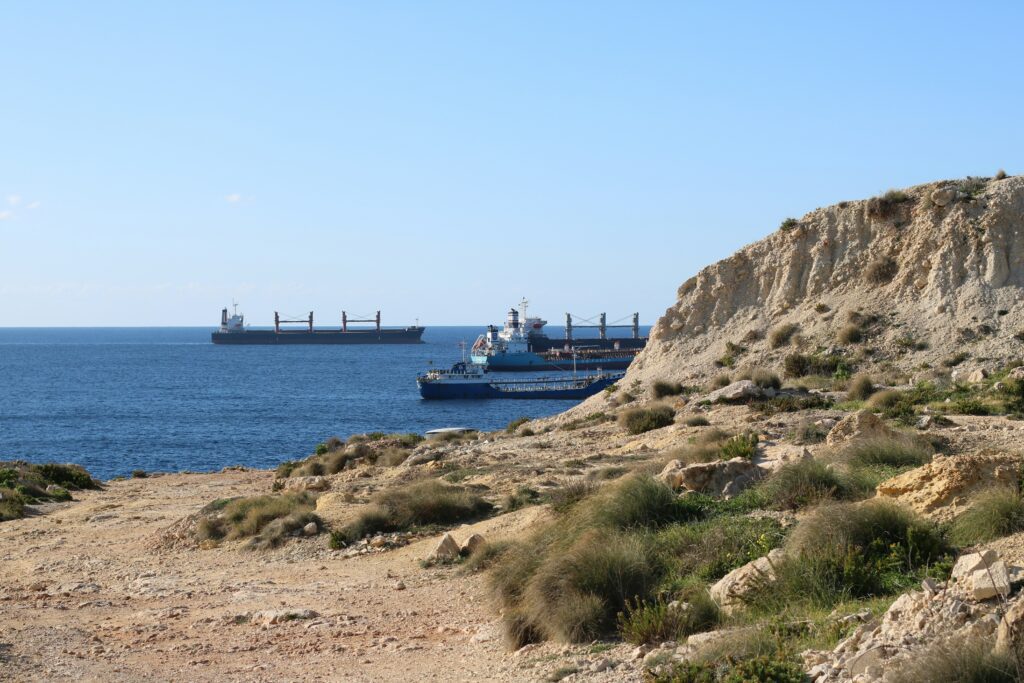Introduction: The Growing Importance of Traceability and Transparency in Bunker Fuel Supply Chains
In today’s maritime industry, ensuring the quality and integrity of bunker fuel is more critical than ever. With stringent environmental regulations, increasing concerns over fuel contamination, and the complex nature of global supply chains, the demand for greater traceability and transparency in bunker fuel transactions has intensified. Blockchain technology, with its ability to provide immutable records and enhance visibility across supply chains, is emerging as a powerful tool for addressing these challenges.
This article explores how blockchain technology can revolutionize traceability and transparency in bunker fuel supply chains, offering ship operators and other stakeholders a robust solution for quality assurance and regulatory compliance.
The Challenges of Bunker Fuel Supply Chains: Complexity and Vulnerability
Bunker fuel supply chains are inherently complex, involving multiple parties, including suppliers, traders, storage facilities, and shipping companies. This complexity can create significant challenges in ensuring the quality and consistency of fuel delivered to vessels.
- Fuel Contamination and Adulteration
One of the primary concerns in bunker fuel supply chains is the risk of fuel contamination and adulteration. Contaminated fuel can lead to severe operational issues, including engine damage, increased maintenance costs, and even catastrophic failures at sea. Adulteration, where lower-quality fuels are mixed with higher-grade products, can also undermine fuel quality and compliance with environmental regulations.
Given the potential consequences, ensuring the integrity of bunker fuel from production to delivery is paramount. However, traditional methods of quality control often fall short in providing the necessary transparency and traceability across the entire supply chain.
- Lack of Visibility Across the Supply Chain
Another significant challenge is the lack of visibility across the bunker fuel supply chain. Ship operators often rely on a network of intermediaries to source fuel, making it difficult to trace the origin of the fuel or verify its quality before it reaches the vessel. This lack of transparency can lead to disputes, delays, and added costs, particularly when fuel quality issues arise.
Without a reliable system to track and verify fuel transactions, stakeholders are left vulnerable to fraud, mismanagement, and regulatory non-compliance. This underscores the need for a more transparent and traceable supply chain solution.
Blockchain Technology: A Solution for Enhanced Traceability and Transparency
Blockchain technology, best known for its role in cryptocurrency transactions, is gaining traction in various industries, including maritime logistics, for its potential to enhance supply chain transparency and traceability. At its core, blockchain is a decentralized, digital ledger that records transactions in a secure, transparent, and immutable manner. This makes it an ideal solution for addressing the challenges of bunker fuel supply chains.
- Immutable Records: Ensuring Fuel Quality and Compliance
One of the most significant advantages of blockchain technology is its ability to create immutable records of transactions. Once a transaction is recorded on the blockchain, it cannot be altered or deleted. This feature is particularly valuable in the context of bunker fuel supply chains, where the accuracy and integrity of records are critical for ensuring fuel quality and compliance.
- Fuel Quality Assurance: By recording each step of the fuel supply process on the blockchain, from production to delivery, stakeholders can trace the origin of the fuel, verify its quality, and ensure that it meets regulatory standards. This reduces the risk of contamination and adulteration, providing greater confidence in the fuel’s integrity.
- Regulatory Compliance: Blockchain can also facilitate compliance with international regulations, such as the International Maritime Organization’s (IMO) 2020 Sulphur Cap. By providing a transparent and tamper-proof record of fuel transactions, blockchain helps ensure that only compliant fuels are used, reducing the risk of penalties and reputational damage.
- Enhanced Transparency: Building Trust Among Stakeholders
Transparency is a key benefit of blockchain technology, as it allows all parties involved in the supply chain to view and verify transactions in real-time. This level of visibility is particularly valuable in the bunker fuel industry, where trust between suppliers, traders, and ship operators is essential.
- Real-Time Monitoring: With blockchain, stakeholders can monitor the movement of fuel through the supply chain in real-time, ensuring that it is handled and stored properly at each stage. This reduces the risk of discrepancies and ensures that any issues are identified and addressed promptly.
- Dispute Resolution: The transparency provided by blockchain also facilitates faster and more effective dispute resolution. In the event of a disagreement over fuel quality or delivery, stakeholders can refer to the blockchain ledger to verify the details of the transaction, reducing the time and costs associated with resolving disputes.
Case Study: Blockchain Implementation in Bunker Fuel Supply Chains
To illustrate the potential benefits of blockchain technology in bunker fuel supply chains, consider a real-world case study involving a major shipping company that adopted blockchain to enhance transparency and traceability.
Background
The shipping company, facing recurring issues with fuel quality and supply chain inefficiencies, decided to implement a blockchain-based system to track its bunker fuel transactions. The company partnered with a technology provider to develop a blockchain platform that would record every step of the fuel supply process, from refinery to vessel.
Implementation and Results
- Improved Traceability: The blockchain system allowed the company to trace the origin and quality of the fuel in real-time, ensuring that only compliant fuels were delivered to its vessels. This significantly reduced the risk of contamination and improved overall fuel quality.
- Enhanced Transparency: The platform provided all stakeholders with real-time access to transaction data, building trust between the company, its suppliers, and its customers. This transparency also led to faster dispute resolution and reduced the risk of fraud.
- Cost Savings: By improving the efficiency of its fuel supply chain, the company was able to reduce operational costs, including those related to fuel testing, quality assurance, and dispute resolution. The implementation of blockchain also reduced the company’s reliance on intermediaries, further lowering costs.
This case study demonstrates the transformative potential of blockchain technology in bunker fuel supply chains, offering a blueprint for other companies looking to enhance traceability and transparency.
Challenges and Considerations: Navigating the Adoption of Blockchain
While blockchain offers significant benefits for traceability and transparency in bunker fuel supply chains, its adoption is not without challenges. Companies must carefully consider the following factors when implementing blockchain technology:
- Integration with Existing Systems
Integrating blockchain with existing supply chain management systems can be complex and costly. Companies need to ensure that their blockchain solution is compatible with their current infrastructure and that all stakeholders are on board with the transition. This may require significant investment in technology and training, as well as collaboration with partners across the supply chain.
- Data Privacy and Security
While blockchain is inherently secure, companies must still address concerns related to data privacy. The transparency of blockchain means that all stakeholders can access transaction data, which may include sensitive information. Companies need to implement robust data protection measures to ensure that confidential information is safeguarded while still benefiting from the transparency of the blockchain.
- Regulatory Considerations
As with any new technology, the regulatory landscape for blockchain is still evolving. Companies must stay informed about relevant regulations and ensure that their blockchain implementation complies with legal requirements. This may involve working closely with regulators to develop industry standards and best practices for blockchain in bunker fuel supply chains.
- Scalability and Performance
The scalability of blockchain technology is another consideration. As the number of transactions and participants in a blockchain network grows, the system may experience performance issues. Companies need to choose a blockchain solution that can scale to meet the demands of their supply chain without compromising speed or efficiency.
Future Outlook: The Role of Blockchain in Shaping the Future of Bunker Fuel Supply Chains
As the maritime industry continues to evolve, the demand for greater traceability and transparency in bunker fuel supply chains is likely to grow. Blockchain technology offers a promising solution to these challenges, providing a secure, transparent, and efficient way to manage fuel transactions and ensure quality assurance.
In the future, we can expect to see broader adoption of blockchain in the maritime industry, driven by the need for compliance with environmental regulations, the desire for cost savings, and the increasing importance of sustainability. As blockchain technology matures and becomes more widely accepted, it has the potential to become a standard tool for managing bunker fuel supply chains.
Potential Developments
- Integration with IoT: The integration of blockchain with Internet of Things (IoT) devices could further enhance the traceability and transparency of bunker fuel supply chains. IoT sensors could monitor fuel quality and conditions in real-time, feeding data directly into the blockchain ledger for continuous tracking and verification.
- Industry Collaboration: Collaboration between industry stakeholders, including fuel suppliers, shipping companies, and regulators, will be key to the successful adoption of blockchain. By working together to develop standardized blockchain protocols and practices, the maritime industry can maximize the benefits of this technology.
- Regulatory Support: As regulators recognize the potential of blockchain for improving compliance and reducing fraud, we may see increased support for its adoption. This could include the development of regulatory frameworks that encourage the use of blockchain in bunker fuel supply chains.
Conclusion: Embracing Blockchain for a More Transparent and Traceable Future
Blockchain technology represents a significant opportunity for the maritime industry to enhance the traceability and transparency of bunker fuel supply chains. By providing immutable records, real-time visibility, and secure transactions, blockchain can help ship operators and other stakeholders ensure fuel quality, comply with regulations, and reduce operational costs.
While challenges remain in terms of integration, data privacy, and scalability, the potential benefits of blockchain far outweigh the hurdles. As the industry moves towards greater digitalization and innovation, embracing blockchain could be a critical step towards building more resilient, efficient, and trustworthy bunker fuel supply chains.
In a world where the integrity of fuel supply chains is more important than ever, blockchain offers a path forward—one that promises not only to enhance operational efficiency but also to build trust and transparency across the entire maritime industry.
– Krupali Gajara


